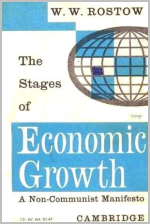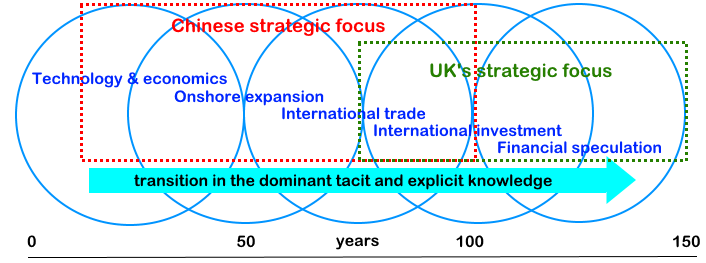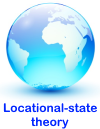Hegemon: A leader, country, or group that is very strong and powerful and therefore able to control others.
The seminal work by Giovanni Arrighi in the form of, "The Long Twentieth Century" privdes copious evidence for the significance of hegenomic cycles and, "Adam Smith in Beijing" reviews a commonly overlooked detail in Adam Smith's work predicting this evolution. |
|
|
Although emphasis on the application side in this website refers to natural resources and agricultural applications there is an important socio-political aspect of significance to the wellbeing of the population because of the impact of LST on the localization of experience in terms of location of peoples in the space-time dimensions.

If we review geographic and economic development texts they will refer to the different stages of economic growth such as those set out by Walt Rostow in a book carrying the title, "
The Stages of Economic Growth", published in 1960.
The locational-states of known universes

One of the important concepts identified by Locational-State Theory is the notion of the known universe of the constituency and leadership. This refers to the location of populations wihin hegemonic cycles and their priorities for actions responding to the dominant current stage in that cycle. As a result, what becomes the dominant scientific and technological capability and economic theory and practice is influenced by exposure to and need to respond to conditions associated with the hegemonic phase This impacts the thinking of all current generations.
In the diagram of the hegemonic cycle the known universe of the current generations in China are not the same of the current generations in the UK. These impact strategic foci. This is why trying to "compete" with China applying our current known universe of logic based on our capabilities, our "strengths" is doomed to be ineffective if not a complete failure because any competition involves competing on the basis of developing comparative or better processes that make up the strategic focus of the rising hegemon.
|
|
|
However, what is lost in such work are the world events that mould the perceptions of economists in the present such as the overal impact of hegemonic cycles which to a large extent explain Rostow's synthesis but from a standpoint of a world as opposed to a country perspective. Of significance is that Rostow's work ends the economic development process in a stage which he named "age of mass consumption" assuming the production of consumed goods remained within the country whose stages of economic growth are being described. What is missing from Rostow's analysis is the hegemonic cycle stages of global exports, the accumulation of capital, de-industrialization and then financial speculative economy. Indeed the work by Giovanni Arrighi and Immanuel Wallerstein on World Systems provides a more integrated and complete explanation of the stages of economic growth. To be fair to Rostow, his focus was the USA which was entering the globalization phase just after the publication of his book. On the other hand, hegemonic cycles had occurred involving the Unite Kingdom, The Netherlands, Portugal and previously Venetian and other cultures and economies.
In this context the locational-state concept of "known universes" is of some relevance. Hegemonic cycles run in sequence but they also overlap. This means that what provides a country at any particular time with a relative advantage to gain dominance in certain pursuits is not the same as what provides countries in other stages of their hegemonic cycles any current advantage. Thus as the USA and UK decline while possessing more effective abilities in manipulating finance, China is growing, largely based on refinement of technological innovation and rising productvity in designing and manufacturing producing products for export. These particular skills have been increasingly lost to the USA and UK over the last 80 years. Thus the known complement of experience in the UK is not the same as that known complement of experience in China resulting in their known universes being significantly different.
In economic strategic terms the impact of different known universes is that these differences are so significant that countries cannot compete directly on "equal terms" because the skill sets and mind sets are different. At the extreme, rather than compete on the basis of comparative skills in carrying out the same processes, resort is made to economic and financial sanctions which are highly prejudicial to the constituencies in the countries concerned.
The structure of known universesElton Mayo, in his work,
"The Social Problems of an Industrial Civilization", (Routledge & Kegan Paul Ltd., London, 148pp. 1949) noted that,
"A simple distinction made by William James in 1890 has all the significance now that it had then; one can only suppose that its very simplicity has led the universities to brush it aside as obvious, which is true, or as of small account, which is not true. James pointed out that almost every civilized language except English has two commonplace words for knowledge-connaitre and savoir - knowledge-of-acquaintance and knowledge-about. This distinction, simple as it is, nevertheless is exceedingly important; knowledge-of-acquaintance comes from direct experience of fact and situation, knowledge-about is the product of reflective and abstract thinking." |
Therefore each person knows about things as well as how to manage or do things. This is the distinction between explicit knowledge made up of words, symbols, mathematical logic and data and narratives and tacit knowledge made up of personal internalised capabilities linked to acquainaence and practice in managing specific tasks. As a result the capability of an economy to operate effectivey and efficiently cross sectors (primary, secondary and tertiary) is directly related to the makeup of the content of the known universes of the population in terms of explicit and tacit knowledge.
The impact of known universes on economic theory and policiesManging the economy is an important subject geared towards sustainable development and human wellbeing. However, economists and politicians need to respond to emerging issues with beneficial solutions. In terms of the balance of payments and the earning capacity of a country there are cycles in the competence with which policy responds to emerging issues. Because the majority of experience and learning of economists tends to concentrate on the experience of the last couple of generations set within a hegemonic cycle the emphasis of policy tends to be dominated by the current perceived-to-be-beneficial theory and derived policy. Therefore, in the current phase of the United Kindom's hegemonic cycle there is a considerable bias in macroeconomic theory andpolicy towards an emphasis on monetarism. This is directly related to the experience developed over the last century linked to accumulating capital and rising dominance of financial dealing being the fundamental measure of economic productivity. Therefore responding to Chinese competition that is based on a rising technological competence, UK economic policies have to technological tacit knowledge upon which to base policies that will work in practice because the development of tacit knowledge takes a considerable amount of time, relying on the learning curve and a continuity of an enmvironment within which there exists the opportunity and incentive to gain repetitive practice in carrying out specific tasks (see
Process evolution).
Please note: As a result of recent research undertaken by the Decision Analysis Group at SEEL-Systems Engineering Economics Lab
1, this section wil be significantly extended.
1 SEEL is the applied development division division of the George Boole Foundation Limited.
